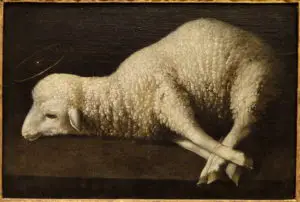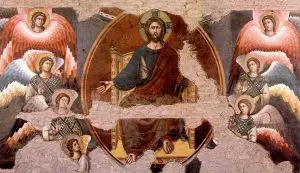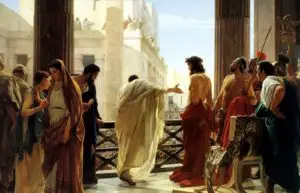Isaiah chapter 53 is perhaps the most poignant passage the prophet from 8th century BC ever penned. It is also the most familiar among Christians for it portrays the coming Messiah as one who, although “he had done no violence, nor was there any deceit in his mouth,”[1] would suffer greatly for the sins of man. The beloved passage, which begins in the preceding chapter, is the fourth of Isaiah’s Servant Songs.[2] In this post, we will examine who the prophet says the Messiah is versus the claims of modern orthodoxy.
The Suffering of God’s Servant
The song describes the Messiah as one who grew up like a tender shoot before Yahweh and whose outward appearance did not portray him as one destined to glory.[3] It juxtaposes this picture of innocence and future majesty with a vivid description of the physical and emotional agony that God’s servant would endure:

Isaiah 52:14 (NASB) Just as many were astonished at you, My people, So His appearance was marred more than any man And His form more than the sons of men.
Isaiah 53:3-4 (NASB) He was despised and forsaken of men, A man of sorrows and acquainted with grief; And like one from whom men hide their face He was despised, and we did not esteem Him. 4 Surely our griefs He Himself bore, And our sorrows He carried; Yet we ourselves esteemed Him stricken, Smitten of God, and afflicted.
Isaiah 53:7 (NASB) He was oppressed and He was afflicted, Yet He did not open His mouth; Like a lamb that is led to slaughter, And like a sheep that is silent before its shearers, So He did not open His mouth.
Why would God’s servant, the one destined to be king, be called to endure such suffering and humiliation? According to the prophecy, the Messiah was chastened and stricken for our well-being. Indeed, God caused the punishment for our iniquity to fall upon him:
Isaiah 53:5-6 (NASB) But He was pierced through for our transgressions, He was crushed for our iniquities; The chastening for our well-being fell upon Him, And by His scourging we are healed. 6 All of us like sheep have gone astray, Each of us has turned to his own way; But the LORD has caused the iniquity of us all To fall on Him.

The Death of God’s Servant
Not only would God’s anointed suffer for the sins of others, the one chosen to rule on God’s behalf would die a condemned man, although innocent:
Isaiah 53:8-9 (NASB) By oppression and judgment He was taken away; and as for His generation, who considered that He was cut off out of the land of the living for the transgression of my people, to whom the stroke was due? 9 His grave was assigned with wicked men. Yet He was with a rich man in His death, because He had done no violence, Nor was there any deceit in His mouth.
This song, while poignant, is problematic for modern orthodoxy, which insists that it is a depiction of the suffering that God would personally endure as a result of taking on human flesh. This view is prominent despite the fact that the text says nothing about an incarnated deity or that God would personally pay for the sins of mankind. On the contrary, the passage portrays a human Messiah, one who is capable of physical suffering, emotional anguish, and ultimately death. This man is clearly someone who is not God but who is the servant of God.
Without question, the suffering of Yahweh’s servant is a major theme of this song. But the song is also about the recompense God would give him for his obedience to render himself as a guilt offering:
Isaiah 53:10 (NASB) But the LORD was pleased To crush Him, putting Him to grief; If He would render Himself as a guilt offering, He will see His offspring, He will prolong His days, And the good pleasure of the LORD will prosper in His hand. (emphasis added)
Note the conditional phrasing of this passage: If the Messiah would render himself as a guilt offering, he will see his offspring and prolong his days. The word if here is translated from the Hebrew word im.[4] According to The Complete Word Study Dictionary, im is:
“A particle meaning when, if, whenever. This word introduces conditional sentences capable of being fulfilled regularly, both in legal and everyday settings.”[5]
Other Bible translations render im in this passage as when instead of if,[6] dulling for the English reader, the conditionality of the passage.[7] Nevertheless, the transaction that will take place between God and His servant depends on the latter’s obedience. If the Messiah would render himself a guilt offering in death, God promised His servant would see his offspring and prolong his days. The only way for the dead servant to receive the promise is for God to raise him from the dead. Now that the prophecy has been fulfilled in Jesus’ death and resurrection, we understand these promises pertain to his eternal life and spiritual progeny.

It is no wonder that the conditionality of the passage is downplayed by Trinitarians. Those who believe in the deity of Christ often speak of the gospel as being Jesus’ plan. However, Jesus said from the Garden of Gethsemane that it was not his will to die, but the will of his Father.[8] Isaiah’s Servant Song indicates that it pleased God for His will to prosper in the hand of His servant.[9] What’s more, John 3:16 famously tells us that it was the love of God that motivated Him to give His Son for the sacrifice of sins. It was not the love of the Son or of the Trinity, but the love of God, which, according to the context, is the Father.
If Jesus is God, how could the promise of prolonged days be a meaningful reward for an eternal being? In other words, how could the offer of eternal life incentivize the immortal God? Moreover, how could God the Son be enticed into obedience with the promise of offspring when the earth and all who dwell in it belong to Him?[10] Does God need to be rewarded for His obedience? Is it even possible for God to disobey? These are just a few of the many questions that are generated when Isaiah 53 is viewed through the 4th century creedal lens of the Trinity. It creates all manner of problems when the Messiah is seen as more than a man.
Some might offer that it was Jesus’ human nature that was promised eternal life and spiritual progeny. But the God-man dual nature caveat is never taught in Scripture. Rather, the theory was developed over a period of almost four centuries by Church Fathers who read the Scriptures through a Greek philosophical lens. Instead, the simplest and most straightforward explanation of this passage, and the one that Jews would have understood, is that God recompensed his human servant for his ultimate obedience. This plain rendering of the passage does not generate problems like the post-Biblical one does.
The Exaltation of God’s Servant
While much of orthodoxy focuses on Isaiah’s revelation that the Messiah will suffer and die, the focus is shortsighted for, as we have already seen, it ignores that God’s servant will be rewarded with eternal life and spiritual progeny. But the wonder of the passage is greater still. It is not until we understand that the Messiah will be highly exalted for his willingness to humble himself to the point of death that we can begin to grasp the extent of his reward:
Isaiah 53:11-13 (NASB) As a result of the anguish of His soul, He will see it and be satisfied; By His knowledge the Righteous One, My Servant, will justify the many, As He will bear their iniquities. 12 Therefore, I will allot Him a portion with the great, And He will divide the booty with the strong; Because He poured out Himself to death, And was numbered with the transgressors; Yet He Himself bore the sin of many, And interceded for the transgressors. 13 Behold, My servant will prosper, He will be high and lifted up and greatly exalted. (emphasis added)
God promised to reward His servant by highly exalting him and giving him a portion with the great. The apostle Paul provides us with an explanation of what this means:
Philippians 2:8-11 (NASB) Being found in appearance as a man, He humbled Himself by becoming obedient to the point of death, even death on a cross. 9 For this reason also, God highly exalted Him, and bestowed on Him the name which is above every name, 10 so that at the name of Jesus EVERY KNEE WILL BOW, of those who are in heaven and on earth and under the earth, 11 and that every tongue will confess that Jesus Christ is Lord, to the glory of God the Father. (emphasis added)
If Jesus is God, the promise of exaltation would hold no sway for the second member of the Trinity as he would already occupy the highest place. But when we understand that God’s servant is the human Messiah and that he was exalted for his obedience, we can more fully grasp the wonder of what Jesus did and the extent to which God rewarded him:
Ephesians 1:19-23 (NASB) and what is the surpassing greatness of His power toward us who believe. These are in accordance with the working of the strength of His might 20 which He brought about in Christ, when He raised Him from the dead and seated Him at His right hand in the heavenly places, 21 far above all rule and authority and power and dominion, and every name that is named, not only in this age but also in the one to come. 22 And He put all things in subjection under His feet, and gave Him as head over all things to the church, 23 which is His body, the fullness of Him who fills all in all. (emphasis added)
The Last Adam (1 Cor. 15:45) was exalted to God’s right hand, not because he is God, but because he obeyed His God.
Is Israel the Suffering Servant?
Some, in an attempt to dismiss Jesus’ sacrificial obedience, claim that Isaiah’s fourth Servant Song does not refer to the coming Messiah. Citing a popularized rabbinic interpretation from the Middle Ages[11] and Isaiah 49 (the second Servant Song) as proof, they claim that Isaiah 53 refers to the nation of Israel:
Isaiah 49:1-4 (NASB) Listen to Me, O islands, And pay attention, you peoples from afar. The LORD called Me from the womb; From the body of My mother He named Me. 2 He has made My mouth like a sharp sword, In the shadow of His hand He has concealed Me; And He has also made Me a select arrow, He has hidden Me in His quiver. 3 He said to Me, “You are My Servant, Israel, In Whom I will show My glory.” 4 But I said, “I have toiled in vain, I have spent My strength for nothing and vanity; Yet surely the justice due to Me is with the LORD, And My reward with My God.” (emphasis added)
Jewish tradition, however, records numerous instances where Isaiah 53 is said to be about the coming Messiah.[12] Furthermore, Biblical scholars agree that My Servant, Israel in this passage is a reference to the Messiah who would act as the “ideal Israel” and “the representative man of the nation.”[13]
God’s servant in these songs cannot be a reference to the nation of Israel because we are told that he will fulfill the call to be a light to the nations, something the nation of Israel was called to do but often failed. The Messiah, on the other hand, according to Isaiah, would succeed.[14]
In addition, Isaiah 53 depicts an innocent person suffering for the sins of others. This is hardly a description of the nation of Israel whose habitual sins brought the judgment of God. For this reason, Israel could not fulfill Isaiah’s prophecy to be the innocent one smitten for the sins of guilty Israel.
Another reason we know that the servant of Isaiah 53 does not refer to the nation of Israel is found in Philip’s use of the prophecy to explain Jesus to the Ethiopian eunuch:
Acts 8:32-35 (NASB) Now the passage of Scripture which he was reading was this: “HE WAS LED AS A SHEEP TO SLAUGHTER; AND AS A LAMB BEFORE ITS SHEARER IS SILENT, SO HE DOES NOT OPEN HIS MOUTH. 33 “IN HUMILIATION HIS JUDGMENT WAS TAKEN AWAY; WHO WILL RELATE HIS GENERATION? FOR HIS LIFE IS REMOVED FROM THE EARTH.” 34 The eunuch answered Philip and said, “Please tell me, of whom does the prophet say this? Of himself or of someone else?” 35 Then Philip opened his mouth, and beginning from this Scripture he preached Jesus to him.
When asked who the prophecy from Isaiah 53 referred to, Philip used it as a starting point to tell the eunuch about Jesus, not about the nation of Israel. Moreover, scholars understand that when Jesus told his disciples at the Last Supper that the Passover cup was his blood poured out for the many,[15] that he was referring to Isaiah 53:12, which says that God’s servant would be rewarded for pouring himself out unto death. The picture here is one of a voluntary sacrifice, something sinful Israel never did.
In Isaiah’s fourth Servant Song, we see that the Messiah is not God, but the servant of God; a man who suffered, died, was resurrected, and promoted to God’s right hand for his obedience. Unfortunately, modern orthodoxy’s sole emphasis on the suffering depicted in this passage deflects from the exaltation of the Messiah, a point that exposes the fallacy of the doctrine of the deity of Christ.
[1] Isaiah 53:5-6, 8-9.
[2] Isaiah 42:1-9; 49:1-13; 50:4-11; 52:13 through 53:12.
[3] Isaiah 53:2.
[4] Strong’s Concordance #518
[5] Warren Baker, Eugene Carpenter, The Complete Word Study Dictionary, Old Testament, (Chattanooga: AMG Publishers), 2003, p. 66.
[6] Ellicott’s Commentary says if is a better translation that when
[7] John Dummelow’s Commentary on the Bible notes this to be a conditional arrangement between God and His servant.
[8] Luke 22:42.
[9] Isaiah 53:10 good pleasure is understood to mean God’s will. See the Amplified Bible’s translation
[10] Psalm 24:1.
[11] In the Middle Ages, Rabbi Shlomo Itzchaki’s (a.k.a., Rashi) view that Isaiah 53 referred to the nation of Israel became popular. Prior to this, the rabbinic consensus was that the prophecy was Messianic in nature. https://jewsforjesus.org/publications/issues/issues-v13-n06/whos-the-subject-of-isaiah-53-you-decide/
[12] Here is a list of quotes that demonstrates the Messianic interpretation of Isaiah 53 has a rich presence in historic Judaism. https://jewsforjesus.org/answers/jewish-messianic-interpretations-of-isaiah-53/
[13] Jamieson-Fausset-Brown Bible Commentary, Isaiah 49:2;
[14] Isaiah 42:6-9; 49:6.
[15] Mark 14:24.




